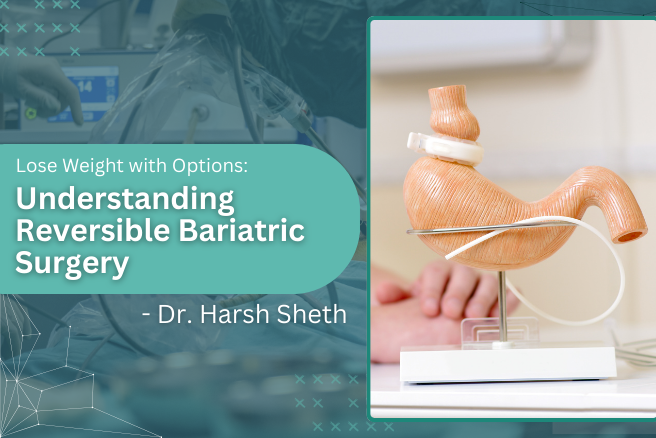Weight loss surgery is a life-altering option for people who are obese. Of all the available options, reversible weight loss surgery provides special benefits that are appealing to people who are looking for flexibility.
Dr. Harsh Sheth, a well-known bariatric surgeon in Mumbai, points out, “Reversible weight loss surgery gives patients the opportunity to achieve significant weight loss while maintaining the option to reverse the procedure if needed.” With extensive experience, Dr. Sheth provides expert advice in the field of bariatric surgery, enabling patients to make informed choices regarding their health and weight loss process.

What is Reversible Weight Loss Surgery and How Does It Work?
Reversible weight loss surgery is a type of bariatric surgery that aims to facilitate substantial weight reduction with the added choice to reverse the operation should it become necessary. The surgery typically comes in the form of a minimally invasive intervention, lowering the stomach’s capacity and changing the manner in which food is processed.
The most common reversible weight loss surgeries are gastric banding and endoscopic sleeve gastroplasty. During gastric banding, a band is looped around the upper part of the stomach, thus forming a small pouch. This restricts the amount of food one can eat, resulting in weight loss. The band can be adjusted or removed at a later time if necessary, making it reversible.
Conversely, endoscopic sleeve gastroplasty is the process of reducing the size of the stomach through the use of an endoscope, which also provides reversibility.
These procedures function by limiting the amount of food the stomach can hold, consequently lowering calorie consumption and facilitating weight reduction. These procedures can be reversed, unlike permanent surgeries such as gastric bypass, providing flexibility to patients.
What Are the Common Reasons Patients Choose Reversible Weight Loss Surgery?
Many patients choose reversible weight loss surgery for a number of reasons such as:
- Flexibility: Having the option to reverse the surgery, if the need arises, is comforting to individuals who might have concerns about permanent changes to their bodies.
- Reversibility for Future Decisions: Some patients may want to have children or experience changes in life where body size change might prove useful. Reversible weight reduction surgery offers the chance without long-term obligation.
- Minimally Invasive: Reversible surgeries are less invasive compared to permanent weight loss procedures such as gastric bypass, and therefore the recovery is faster and less painful.
- Lower Risk of Complications: Reversible weight loss surgeries are associated with a lower risk of complications compared to other permanent bariatric surgeries.
Is It Normal to Experience Side Effects After Reversible Weight Loss Surgery?
As with any surgery, patients may experience some side effects following reversible weight loss surgery. These side effects are mostly manageable and temporary. They include:
- Nausea and Vomiting: Particularly during the initial phase of the recovery process, nausea and vomiting may be experienced as the body adapts to the new eating habits.
- Trouble Swallowing: Some patients might have trouble swallowing or sense that the food is not passing through the digestive system in the normal manner.
- Gastrointestinal Problems: Diarrhea or constipation may be experienced as the digestive system adapts to the new alteration in the size of the stomach and digestive process.
- Abdominal Pain: Some cramping or discomfort may occur as the body recuperates.
It’s also critical for patients to speak with their physicians and strictly adhere to post-operative instructions in order to reduce these side effects.
What Should Patients Do to Maintain Weight Loss After Reversing the Surgery?
Sustaining weight loss following reversible weight loss surgery needs to be aided by a combination of lifestyle modifications, discipline, and periodic follow-up. Dr. Harsh Sheth recommends that patients make conscious efforts to achieve long-term success even if they opt for reversal of the surgery. Following are some important strategies:
- Develop Healthy Eating Habits: Patients must concentrate on consuming well-balanced meals so that their diets are nutritious and portion-controlled.
- Remain Physically Active: Regular physical activity stimulates metabolism, preserves muscle mass, and supports weight loss. The combination of aerobic exercise and strength training is recommended.
- Seek Help: Support groups or the assistance of a dietitian or therapist can help with emotional eating and accountability.
- Track Weight and Health Regularly: Regular appointments with a bariatric surgeon or medical provider can help monitor progress and modify diet or exercise regimen when necessary.
Conclusion
Reversible weight loss surgery is an enticing choice for individuals looking for flexibility in their weight reduction process. It gives the advantages of substantial weight reduction with the alternative of reversal in case of changing circumstances in the future. Like all weight reduction surgery, it’s important to follow post-operative instructions, maintain a healthy lifestyle, and be watchful of your weight and well-being.






